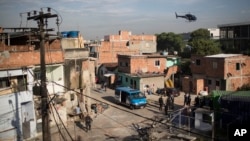RIO DE JANEIRO —
Brazil will deploy federal troops to Rio de Janeiro to help quell a surge in violent crime following attacks by drug traffickers on police posts in three slums on the north side of the city, government officials said on Friday.
Less than three months before Rio welcomes tens of thousands of foreign soccer fans for the World Cup, the attacks cast new doubts on government efforts to expel gangs from slums using a strong police presence. The city will host the Olympics in 2016.
Rio de Janeiro state Governor SDergio Cabral met president Dilma Rousseff on Friday morning and asked for federal troops to be deployed to help stop the attacks on police units overseeing slums across Rio de Janeiro, Brazil's second largest city.
“They [gangs] want us to retreat, but with the help of the president and the federal government we will continue to advance,” Cabral said after meeting with Rousseff and securing the dispatch of troops to Rio.
On Thursday night, shooting broke out between drug traffickers and police in a slum near the Manguinhos complex of shantytowns. Three policemen were shot and wounded, including the Manguinhos police chief, local media reported. The attackers set fire to and destroyed the local police post housed in a converted cargo container.
The gangs, made up mainly of drug traffickers, knocked down power lines during the attack, leaving Manguinhos in the dark.
Violence is on the rise again in the slums ringing Rio that were “pacified” in recent years by police occupations as drug traffickers seek to reconquer their lost territory.
The backlash to the police operations in Rio has heightened concerns about security and law and order during the World Cup and the Olympics, global events that political leaders had hoped would showcase the emergence of a modern Brazil.
An estimated 600,000 foreign soccer fans will arrive in Brazil for the World Cup in June. Seven games will be played in Rio, including the tournament's July 13 final, in the legendary MaracanDa stadium located a few miles from the Manguinhos slums.
The use of excess force by the police has angered residents and led to criticism from international human right groups of alleged abuses.
Brazilians were shocked this week by images of a woman who was shot and then dragged along the street by a police car when her body fell out of the trunk following a shootout in a slum.
To date, 36 Rio slum areas have been pacified with more than 9,000 police patrolling neighborhoods where 1.5 million people live. Initial success in evicting the gangs was applauded, but the police operations have been criticized for merely displacing crime to other slums.
Less than three months before Rio welcomes tens of thousands of foreign soccer fans for the World Cup, the attacks cast new doubts on government efforts to expel gangs from slums using a strong police presence. The city will host the Olympics in 2016.
Rio de Janeiro state Governor SDergio Cabral met president Dilma Rousseff on Friday morning and asked for federal troops to be deployed to help stop the attacks on police units overseeing slums across Rio de Janeiro, Brazil's second largest city.
“They [gangs] want us to retreat, but with the help of the president and the federal government we will continue to advance,” Cabral said after meeting with Rousseff and securing the dispatch of troops to Rio.
On Thursday night, shooting broke out between drug traffickers and police in a slum near the Manguinhos complex of shantytowns. Three policemen were shot and wounded, including the Manguinhos police chief, local media reported. The attackers set fire to and destroyed the local police post housed in a converted cargo container.
The gangs, made up mainly of drug traffickers, knocked down power lines during the attack, leaving Manguinhos in the dark.
Violence is on the rise again in the slums ringing Rio that were “pacified” in recent years by police occupations as drug traffickers seek to reconquer their lost territory.
The backlash to the police operations in Rio has heightened concerns about security and law and order during the World Cup and the Olympics, global events that political leaders had hoped would showcase the emergence of a modern Brazil.
An estimated 600,000 foreign soccer fans will arrive in Brazil for the World Cup in June. Seven games will be played in Rio, including the tournament's July 13 final, in the legendary MaracanDa stadium located a few miles from the Manguinhos slums.
The use of excess force by the police has angered residents and led to criticism from international human right groups of alleged abuses.
Brazilians were shocked this week by images of a woman who was shot and then dragged along the street by a police car when her body fell out of the trunk following a shootout in a slum.
To date, 36 Rio slum areas have been pacified with more than 9,000 police patrolling neighborhoods where 1.5 million people live. Initial success in evicting the gangs was applauded, but the police operations have been criticized for merely displacing crime to other slums.





